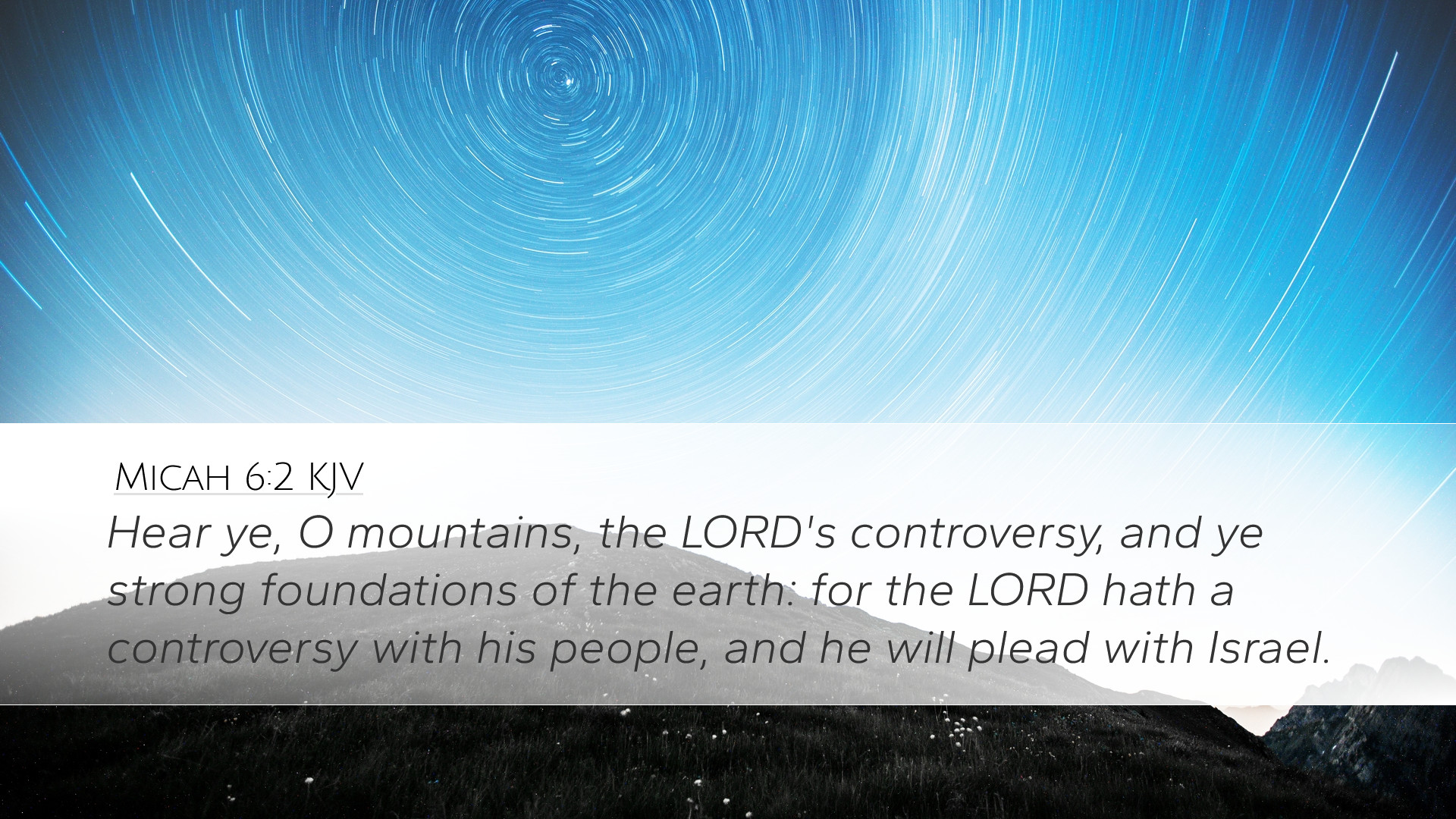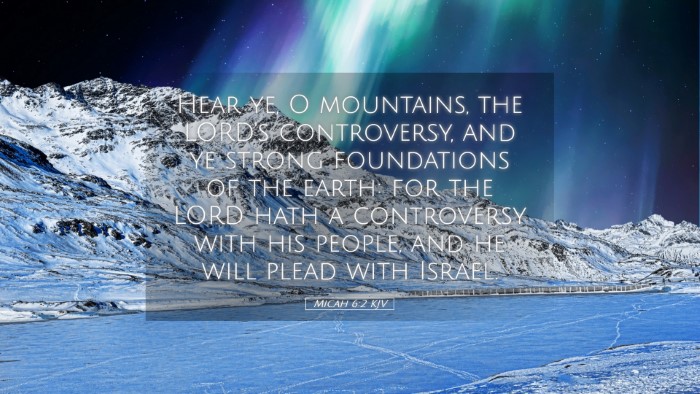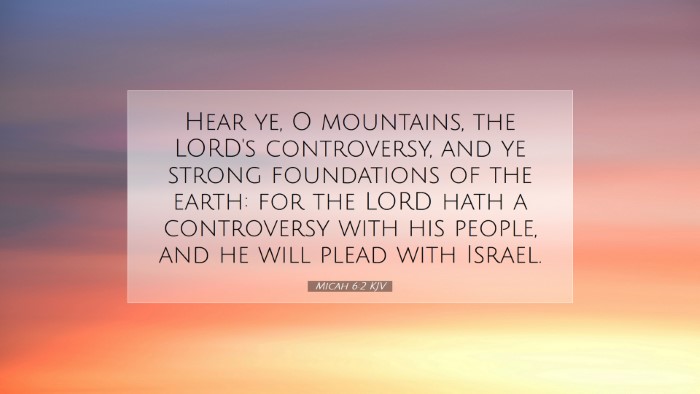Old Testament
Genesis Exodus Leviticus Numbers Deuteronomy Joshua Judges Ruth 1 Samuel 2 Samuel 1 Kings 2 Kings 1 Chronicles 2 Chronicles Ezra Nehemiah Esther Job Psalms Proverbs Ecclesiastes Song of Solomon Isaiah Jeremiah Lamentations Ezekiel Daniel Hosea Joel Amos Obadiah Jonah Micah Nahum Habakkuk Zephaniah Haggai Zechariah MalachiMicah 6:2
Micah 6:2 KJV
Hear ye, O mountains, the LORD's controversy, and ye strong foundations of the earth: for the LORD hath a controversy with his people, and he will plead with Israel.
Micah 6:2 Bible Commentary
Commentary on Micah 6:2
Verse: "Hear ye, O mountains, the Lord's controversy, and ye strong foundations of the earth: for the Lord hath a controversy with his people, and he will plead with Israel."
Micah 6:2 encapsulates a profound message of divine indictment and the seriousness of humanity’s relationship with God. This verse sets the stage for understanding God’s covenant with Israel and His expectations of them. Below, we delve into the insights derived from public domain commentaries, offering a comprehensive analysis for pastors, students, and theologians.
Contextual Overview
The prophetic book of Micah emerges as a critical voice during a tumultuous period in Israel's history. The prophet Micah, contemporary with Isaiah, speaks to both the northern (Israel) and southern (Judah) kingdoms, issuing warnings of impending judgment due to their pervasive sin and corruption.
The Divine Call to Witness
“Hear ye, O mountains…” - Here, Micah personifies the mountains and foundations of the earth, calling upon them to witness the Lord's case against His people. This literary technique amplifies the gravity of the situation.
- Matthew Henry: He emphasizes that the mountains, as enduring witnesses, symbolize the stability of God's creation and reflect the eternal nature of God’s truth. They stand as testimonies to the covenant violations committed by Israel.
- Albert Barnes: Barnes notes that the mountains represent the very creation of God that will testify against humanity if they fail to uphold His commandments. This invokes the idea of accountability to all of God’s creation.
- Adam Clarke: Clarke also alludes to the natural world as a witness; he mentions that even in its silence, creation observes human actions, suggesting that God's judgments are echoed throughout nature.
God's Controversy With His People
“…the Lord hath a controversy with his people…” - This phrase indicates that God's relationship with Israel is one of covenantal obligation. He has a rightful claim to voice His grievances.
- Matthew Henry: He points out that God's "controversy" does not merely denote a legal contest but reflects a moral and spiritual failing among His people who have strayed from their covenant commitments.
- Albert Barnes: Barnes elaborates on the notion that this controversy includes accusations of idolatry, injustice, and a general disregard for God's laws. The text establishes that God is not indifferent but actively engages with His people about their failings.
- Adam Clarke: Clarke explores the implications of this "controversy," noting that it remains a part of God's redemptive plan. God confronts sin to lead His people back to righteousness, indicating His ongoing desire for reconciliation.
The Role of Pleading
“…he will plead with Israel.” - The language here is significant; God, the Almighty, is depicted as a lawyer or an advocate in a court of law. This highlights His desire for justice and righteousness.
- Matthew Henry: He discusses the compassion of God in this portrayal, presenting the idea that God does not simply cast judgment but earnestly seeks to instruct and correct His people.
- Albert Barnes: Barnes mentions that God's pleading represents His grace and mercy, showing His willingness to forgive and redirect His people, unlike the harsher judgment that His holiness could demand.
- Adam Clarke: Clarke dives into the importance of this pleading relationship, emphasizing that God does not desire destruction but aims for transformation, which is a recurring theme in biblical revelation.
Implications for Today’s Believers
Micah 6:2 serves as a reminder to contemporary believers about the seriousness of their covenant with God. The call for the mountains and earth to witness denotes that our actions have broader implications beyond ourselves.
- Accountability: Just as God called upon creation to witness His dealings with Israel, Christians must recognize their accountability to God and to the community around them.
- Repentance and Restoration: The passage invites believers to reflect on their lives and consider where they may be in conflict with God’s standards, encouraging a response of repentance and seeking restoration.
- God's Ongoing Engagement: Believers today should find comfort in the reality that God continues to plead with His people. His disciplinary actions are not punitive but redemptive, aimed at bringing back a wayward heart.
Conclusion
The call of Micah 6:2 is pivotal in understanding the dual themes of responsibility and grace within God’s covenant with His people. By invoking creation as a witness to the divine controversy, Micah underscores the seriousness of sin and the grace that continually seeks to restore God’s relationship with His people.
As we reflect upon this passage, may we be inspired to engage in sincere self-examination, strive for holiness, and accept God's calling in our lives, recognizing that He pleads with us for our good and His glory.


